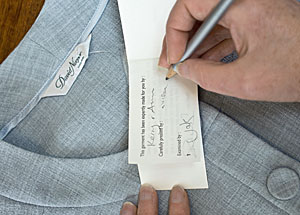On the eve of this year’s London Fashion Week (18-22 September) British Fashion House, David Nieper, asks the fashion industry ‘When will ‘Made in Britain’ be back in fashion?
Decades of offshore fashion manufacturing has shrunk the UK fashion industry beyond recognition since its heyday in the sixties and seventies, although today there are signs of revival in fashion and textile manufacturing. Derbyshire based, fashion house David Nieper calls for more designers to support the industry and bring more manufacturing back to the UK.
According to the Alliance report* the gradual repatriation of fashion companies moving their manufacturing back to the UK is resulting in welcome industry growth, however the majority of UK fashion labels still manufacture overseas.
David Nieper is a family run business set up in 1961 to create luxury ‘Made in Britain’ clothes, all collections are designed, and manufactured in Derbyshire. Each and every garment made is cut, stitched, packaged and personally hand signed by the person that has made it.
Christopher Nieper, Managing Director of David Nieper commented:
“Twenty five years ago we had a huge decision to make, do we stay in Britain or do we go offshore like everybody else? We chose to stay in Britain and have never looked back. Since then the company has grown every year and we’ve remained steadfast in our commitment to local British skills and we do believe there is a growing appetite for British made goods.
The international fashion market has evolved and today economics are a little more in Britain’s favour to support manufacturing. Far Eastern wages are not as low as they were and transport costs have risen so there isn’t so much cost advantage to ‘offshore production’ as there used to be.
Almost all of fashion production has ‘gone offshore’ in the last 25 years for the simple reason it’s cheaper but it’s not all good. There is a long lead time, the quality is hard to control and customers doubt how ethical the factories are and what conditions the staff work in.
In addition the long lead time means that companies can’t react quickly enough to have exactly the right proportion of sizes and colours in stock for customers, which explains why retailers so often need to run sales at generous discounts. This is because they have to clear the stock which didn’t sell.
The whole process of buying stock which doesn’t sell and then discounting is extremely wasteful and a key reason why it’s often more cost effective to manufacture in the UK.
The renaissance of British fashion production is likely to come in niche markets of either premium fashion or made to measure fashion or specialist garments in high performance fabrics for example. It’s unlikely that bulk production of jeans or basic T-shirts will be seen in the UK for a while.
The winning combination Britain can offer is quality and short lead times and ethical production. Earlier this year our company participated in Fashion Revolution day which marked the second anniversary of the Rana Plaza disaster in Dhaka, Bangladesh that killed 1,133 people and injured thousands more, we joined to promote best practice and a fashion industry which values all its people.”
David Nieper employs around 230 staff, with four factory buildings in Alfreton, Derbyshire and four overseas offices in Europe. Since the start of the recession the company has grown by over 30% and is currently receiving record orders.





Pingback: Made in Britain in the news this week: 21 September 2015 - Make it British